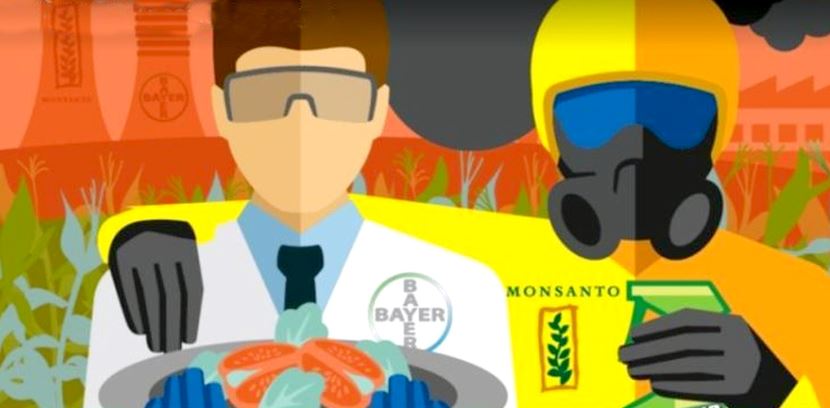Years before merging with Monsanto, BAYER apologized for role in Nazi death experiments which used chemical weapons similar to pesticides
06/07/2018 / By Isabelle Z.

It’s easy to make jokes about Monsanto being aligned with the devil given how much destruction its products and business practices have caused our environment and mankind. However, as the firm’s merger with Bayer moves closer to reality, it finds itself pairing up with a company who, by its own admission, had a direct hand in developing deadly chemical weapons for Adolf Hitler.
The cyanide-based pesticide Zyklon B that Nazi Germany used to kill more than a million people in the gas chambers at Auschwitz, was developed by Interessen-Gemeinschaft Farben, or I. G. Farben for short; Bayer is an offshoot of that company.
In fact, their connection is so strong that a Bayer executive felt the need to apologize for I. G. Farben’s actions during the Holocaust. This turn of events was spurred by Nobel Prize-winning writer Elie Wiesel. The Holocaust survivor canceled a scheduled speech as part of the Three Rivers Lecture Series in 1995 in Pittsburgh, when he learned Bayer was one of the series’ sponsors. It’s hard to blame him; after all, his mother and sister were among the hundreds of thousands of Jews killed at Auschwitz, where many were killed by the Zyklon B gas made by Bayer’s parent company. Wiesel himself worked in one of I.G. Farben’s slave labor factories as a boy.
Upon learning of this, then-Bayer head Helge Wehmeier personally visited Wiesel’s New York apartment to discuss the matter. Wiesel told the Pittsburgh Post-Gazette that he was moved by the gesture but told Wehmeier that Bayer had never apologized for its role in exterminating so many people. This prompted Wehmeier to offer a sincere apology on the spot, saying that the actions of the Nazi regime shocked and shamed him.
When Wiesel did eventually give the speech, it was Wehmeier who introduced him, apologizing before the crowd of 1,800 and saying: “I have sorrow and regret and apologize for the inhumanity in my country and for what I.G. Farben did to your people.”
Monsanto and Bayer may try to downplay this connection, and like Wehmeier, current execs at Bayer aren’t responsible for what happened all those years ago, but the fact that they even felt the need to apologize shows just how culpable they were at the time.
The former I. G. Farben director who played a direct role in the development of Zyklon B, Dr. Fritz ter Meer, was found guilty of crimes against humanity and genocide. After serving four years of a seven-year prison sentence, he returned to work for Bayer and served as its chairman for more than a decade.
Even a firm with a Nazi past doesn’t want Monsanto’s name
Bayer might not be able to escape its past Nazi connections, but the company must think that the name Monsanto carries a far worse connotation, because they’re planning to drop the name when the $63 billion acquisition goes through.
They said in a statement: “Bayer will remain the company name. Monsanto will no longer be a company name. The acquired products will retain their brand names and become part of the Bayer portfolio.”
No matter what name they go by, many people are rightfully concerned that we’re just going to get more of the same with Bayer in control of Monsanto’s assets that include the world’s most popular herbicide, Roundup, which has been labeled a probable carcinogen by the World Health Organization.
In fact, Bayer will soon find themselves in a position where they can cause deadly cancer, infertility and countless other problems to a wide range of people all over the world. Anyone who isn’t nervous about this acquisition needs to pay more attention.
Sources for this article include:
Tagged Under: Bayer, chemical violence, crimes against humanity, Elie Wiesel, Holocause, Holocaust, IG Farben, Monsanto, Nazi, Nazis, poison, toxic chemicals


